|
|
|
Sort Order |
|
|
|
Items / Page
|
|
|
|
|
|
|
| Srl | Item |
| 1 |
ID:
133550
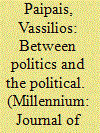

|
|
|
|
|
| Publication |
2014.
|
| Summary/Abstract |
This article situates H. Morgenthau's thought in the context of post-foundationalist theorisations of the difference between politics and the political. In doing so, it shows how Morgenthau's sophisticated realism refused to circumscribe the antagonistic dimension of politics and introduced the study of international politics as a struggle with negativity, temporality and contingency in the wake of the crisis of foundationalism in late modernity. Morgenthau's tarrying with the negative is primarily revealed in his irresolvable tragic oscillation between Nietzschean scepticism and Kantian moralism. Nevertheless, due to its antinomic premises, Morgenthau's tragic vision of politics can still be viewed as stopping a step short of its full-blown critical potential. It is not the purpose of this article, however, to award or withhold credentials of criticality but to recast Morgenthau's theory of the political as an instructive, albeit inconclusive, attempt at a post-foundational political ontology. This may, eventually, serve a purpose far broader than restoring classical realism's latent reflexivity; it may prompt an argument about the conditions and challenges involved in practising international theory as a constant critique of depoliticisation.
|
|
|
|
|
|
|
|
|
|
|
|
|
|
|
|
| 2 |
ID:
133547
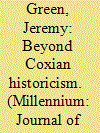

|
|
|
|
|
| Publication |
2014.
|
| Summary/Abstract |
This article scrutinises Robert Cox's theorisation of 19th century world order, proposing 'uneven and combined development' as an alternative conceptual approach. I contend that Cox's understanding of 19th century world order is insufficient as it neglects the significance of German ascendance. Privileging hegemonic construction of world order, Cox's account of the decomposition of Pax Britannica reifies the neo-realist anarchy problematique. Overall, Cox exaggerates the degree of rupture between phases of world order, obscuring developmental continuities that produce different 'geopolitical' contexts. Uneven and combined development, I propose, enables a fruitful reappraisal of the period. Process-based international historical sociology is suggested as an alternative way to think about 19th century world order and critical IR.
|
|
|
|
|
|
|
|
|
|
|
|
|
|
|
|
| 3 |
ID:
133552
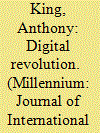

|
|
|
|
|
| Publication |
2014.
|
| Summary/Abstract |
It has been widely acknowledged that military uniforms are significant not only in terms of their practical utility but in terms of their symbolic function. If this is the case, then it is surely noteworthy that in the last ten years there has been a revolution in military uniforms. The disruptive patterns which were the global norm among all military forces in the late twentieth century are in the process of being replaced by new digital patterns. Drawing on the sociology of science and technology, this article explores the development of these uniforms to argue that while neither the scientific research behind digital patterns nor their possible superiority over disruptive designs can be denied, the development of these patterns cannot be seen in purely instrumental or technical terms. Status considerations have been equally important. The paper explores the way in which these new uniforms communicate the new status which professional western forces in the early twenty-first century have been trying to project.
|
|
|
|
|
|
|
|
|
|
|
|
|
|
|
|
| 4 |
ID:
133562


|
|
|
|
|
| Publication |
2014.
|
| Summary/Abstract |
Since the beginning of feminist work in International Relations 25 years ago (e.g. Tickner 1988; Brown 1988; Goetz 1988), scholarship that addresses the question of gender and violence in global politics has proliferated, and become increasingly diverse. At once, this is a cause for both celebration and reflection. It is a cause for celebration because the strong international research community interested in these issues demonstrates that gender issues have come a long way from being unrecognisable in IR (Tickner 1992). At the same time, the very proliferation of research that signifies vibrancy is a cause for reflection - what and where is research on gender/violence in IR?
|
|
|
|
|
|
|
|
|
|
|
|
|
|
|
|
| 5 |
ID:
133558


|
|
|
|
|
| Publication |
2014.
|
| Summary/Abstract |
The author underscores the importance of the book under review and raises a few questions about its method and certain of its findings.
|
|
|
|
|
|
|
|
|
|
|
|
|
|
|
|
| 6 |
ID:
133555
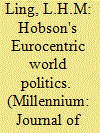

|
|
|
|
|
| Publication |
2014.
|
| Summary/Abstract |
Hobson gives us a definitive accounting of Eurocentrism in IR. The only missing element is gender. Race needs gender to work, I argue. Otherwise, race serves as a mere descriptor.
|
|
|
|
|
|
|
|
|
|
|
|
|
|
|
|
| 7 |
ID:
133546
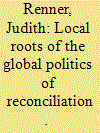

|
|
|
|
|
| Publication |
2014.
|
| Summary/Abstract |
Fostering 'national reconciliation' through public truth-telling processes has become a central objective of post-conflict peacebuilding. This article critically reflects on the global politics of reconciliation by illuminating its process of emergence in the South African transition to democracy. The South African Truth and Reconciliation Commission (TRC) is commonly seen as an authoritative template for reconciliation processes around the globe, and the South African reconciliation experience often serves as a legitimising myth for the global reconciliation project. In this article, I question the intrinsic moral value of reconciliation in general as well as its interpretation in terms of public truth-telling. Drawing on the discourse theory developed by Ernesto Laclau and Chantal Mouffe, I argue that the term 'reconciliation' emerged in South Africa as an empty universal, a vague yet powerful social ideal, that could be embraced by the antagonistic parties of the ANC and NP not because of any intrinsic value, but rather because of its vagueness and semantic flexibility. The particular interpretation of reconciliation in terms of truth-telling was then articulated through the political demands raised by different societal groups, which constructed a reconciliation discourse that produced and naturalised truth-telling and healing as central components of a reconciliation policy. This discourse was eventually stabilised and institutionalised by the workings of the TRC.
|
|
|
|
|
|
|
|
|
|
|
|
|
|
|
|
| 8 |
ID:
133548


|
|
|
|
|
| Publication |
2014.
|
| Summary/Abstract |
The past does not simply provide conditions of possibility for capitalist finance; it also serves as a vital resource for those who might seek to understand or negotiate it in a particular present. However, scholars of finance and crisis have overlooked this point at precisely the same time that they themselves have sought to find clues or lessons in financial history. This article provides a reading of how and why the past has come to acquire such a strange presence within contemporary capitalism. Following Michel de Certeau, it approaches historiography as an operation, focusing on how the past has figured within three distinct but related fields of social science - namely, financial economics, economic history, and constructivist political economy. It demonstrates how each of these fields has been structured around an exclusion of the recollected past as an input into historical process, and argues that this has been revealed by the discursive response to the crisis of 2008, which in turn should be understood as a breakdown in the machinery of capitalist historiography. It concludes by suggesting that, in order to grasp the potential productivity of such a breakdown, scholars of the global economy should begin to make a place for 'the practical past' within both their visions of history and their methods of historical research.
|
|
|
|
|
|
|
|
|
|
|
|
|
|
|
|
| 9 |
ID:
133551
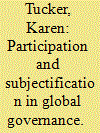

|
|
|
|
|
| Publication |
2014.
|
| Summary/Abstract |
In this article, I examine the ways in which NGO participation in global governance both relies on and produces particular forms of NGO subjectivity. Focusing on NGO interaction with WTO policy-makers in relation to ongoing policy debates about trade, intellectual property law and the protection of 'traditional knowledge' and 'biodiversity', I explore the ways in which particular forms of subjectivity are elicited and rewarded from (would-be) NGO participants in dialogue, consultation and information-sharing with the WTO. I also consider the forms of NGO subjectivity that are treated as normal, credible and acceptable in this field of global governance, and those that are constructed as undesirable and unacceptable. In doing so, I illustrate some of the forms of inclusion and exclusion that underpin the contributions that NGOs make to policy-making on traditional knowledge and biodiversity in the WTO, disrupting and complicating ideas about the qualities that NGOs bring to global governance.
|
|
|
|
|
|
|
|
|
|
|
|
|
|
|
|
| 10 |
ID:
133557
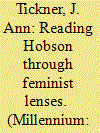

|
|
|
|
|
| Publication |
2014.
|
| Summary/Abstract |
In this article, I suggest ways in which feminist analysis would further enrich Hobson's text. Questioning Hobson's assumption that it is possible to create separate 'metanarratives' about Eurocentrism and patriarchy, I claim that patriarchy, imperialism and Eurocentrism were co-constituted through the practices of Western imperialism and the creation of modern Western knowledge. I then take up Hobson's question that asks whether one is, or is not, Eurocentric is a more important question than whether or not one is a positivist. I argue that both these questions are important and interrelated. Whereas positivism aspires to tell one universal story, post-positivism acknowledges that all theories are constructed in the interest of someone. Therefore it offers us the opportunity to be reflective about our epistemological standpoints - whether or not they are Eurocentric. I then describe some methodological sensitivities concerning these issues that IR feminists have brought to their research. I conclude by reviewing some feminist post-colonial literature that reflects these sensitivities, thereby offering us some tools to overcome the Eurocentric trap.
|
|
|
|
|
|
|
|
|
|
|
|
|
|
|
|
| 11 |
ID:
133556
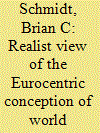

|
|
|
|
|
| Publication |
2014.
|
| Summary/Abstract |
This article provides a critical review of John Hobson's The Eurocentric Conception of World Politics. More specifically, it challenges Hobson's interpretation of realism and it questions the extent to which he accuses earlier thinkers of being racists
|
|
|
|
|
|
|
|
|
|
|
|
|
|
|
|
| 12 |
ID:
133549
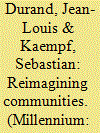

|
|
|
|
|
| Publication |
2014.
|
| Summary/Abstract |
There comes a time when transmitting the history of a national past fails the context of the political present. France and Germany have shared tortuous historical experiences, yet the two are at the forefront of an unprecedented pedagogical development: for the first time ever, two nation-states have created a common history textbook that is used in their senior secondary schools. As such, each country, to borrow Ernst Gellner's formula, has abandoned - qua this textbook - its monopoly of legitimate education. Histoire/Geschichte detaches history from its exclusive national past and introduces the learners to a post-national present. It speaks in a tone that is demanded by a different time and by the new conditions of peoples who are living in a common political space. This article reflects on the meaning and reach of this precedent by first analysing the explicit political and pedagogical explanations inherent to the book. It then identifies and investigates some of the less evident effects of the textbook relating to rethinking war and history, rethinking the monopoly of education, rethinking national identity, and to offering another path to rapprochement.
|
|
|
|
|
|
|
|
|
|
|
|
|
|
|
|
| 13 |
ID:
133560


|
|
|
|
|
| Publication |
2014.
|
| Summary/Abstract |
This is a review article of two books that respond to convergences and turning points in how societies undergoing peacebuilding processes respond and engage with such processes. The two books demonstrate that these interventions are not an overpowering and coherent strategy, and even less so a practice. They suffer constraints and blowbacks in such a way that their moral, political and even military power is not as hegemonic or universally applicable as it was once portrayed in the literature. The different use of 'challenges' and 'resistance' to conceptualise these constraints and blowbacks points to the need for further research on how different actors interact beyond their role as interveners, peacekeepers or local actors.
|
|
|
|
|
|
|
|
|
|
|
|
|
|
|
|
| 14 |
ID:
133559
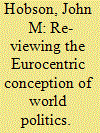

|
|
|
|
|
| Publication |
2014.
|
| Summary/Abstract |
This article responds to the five forum pieces that critically engage my 2012 book The Eurocentric Conception of World Politics, the central argument of which is that ever since 1760 international theory has not provided ideologically neutral, universalist explanations of world politics but has been charged, or even mandated, with the provincial objective of defending, promoting or celebrating Western civilization as the highest referent of the world. The first section defends the book's claim that pre-1945 realism was founded largely on various scientific racist bases (specifically between 1889 and 1945) - what I call 'racist realism' - while the second section defends my claim that classical realism and neorealism are not culturally neutral, universal approaches but are grounded in an underlying Western provincialism. The third section defends my reading of three pioneering figures of IR, John Burgess, Paul Reinsch and J.A. Hobson, while the fourth section reframes my non-Eurocentric reading of international theory in the last 250 years through a gendered lens so as to flesh out how gender/patriarchy and racism/Eurocentric institutionalism are mutually embedded, polymorphous discourses. Finally, the conclusion tackles the dual criticism that the book is limited by its Anglo-centric focus, on the one hand, and its situation within a critical tradition that is inherently European, if not Eurocentric, on the other
|
|
|
|
|
|
|
|
|
|
|
|
|
|
|
|
| 15 |
ID:
133561


|
|
|
|
|
| Publication |
2014.
|
| Summary/Abstract |
Robert Johnson's The Afghan Way of War: How and Why They Fight is a book that should be particularly read by military and civilian personnel deploying to Afghanistan, even though it is not designed to be a policy guide (p. 4). Although Johnson's analysis of the Taliban period and the post-2001 US-led invasion is weak, overall the book delivers a thoughtful analysis of how and why Afghans fight, making it clear that conceptions of 'friends and enemies' carry different implications for Afghans than for westerners, as Afghans are highly conscious of prevailing circumstances. The appeal of the book is that it examines whether an Afghan 'way of war' exists and if so what motivates and drives it. To Johnson, the 'Afghan way of war' is based on topography, culture, opponents' strengths and weaknesses, financial inducement and religion. Although taking an historical approach, Johnson is careful about drawing lessons from history, arguing that historical assessments '…convey values that have been discredited in the West,' (p. 301). An added benefit of the book is Johnson's willingness to investigate Afghan domestic wars and not restrict the study to how the Afghans engaged foreigners, allowing him to declare '…there was no single Afghan way of war in the country's history. Every response has been dependent on the situation that confronted the Afghans,' (p. 36). This may explain why Johnson seems to reject the perception that when it comes to Afghanistan guerrillas do not have an added advantage on conventional forces as these forces, whether Taliban or Mujahedeen, have to contend with a chaotic command and control system, disloyalty, rivalry, poor discipline, assassination threats and weak logistics (p. 303). Johnson's meticulous research allows him to highlight that whether during the First Anglo-Afghan War or the Afghan wars of the mid-nineteenth century, which occurred mainly between the Durrani tribes, Afghans have had to deal with extreme internal divisions that led some Afghans to work with external forces. In other words, political expediency and survivability is what governs the Afghan way of war.
|
|
|
|
|
|
|
|
|
|
|
|
|
|
|
|
| 16 |
ID:
133553
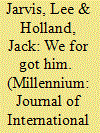

|
|
|
|
|
| Publication |
2014.
|
| Summary/Abstract |
This article explores how the death of Osama bin Laden was narrated by the Obama administration between the night of his killing and the 2012 State of the Union address. Three aspects of this unfolding story, in particular, are explored: i) descriptions of the operation itself; ii) constructions of bin Laden's life and character; iii) accounts of the significance and likely consequences of his killing. The article argues that the narration of these events was characterised, first, by considerable discursive continuity with the war on terrorism discourse of George W. Bush, and, second, by a gradual removal or 'forgetting' of bin Laden and the circumstances of his death. Each of these dynamics, we argue, contributed to the legitimisation of his killing, demonstrating the importance of narrative remembrance and forgetting alike for the conduct and justification of liberal violence.
|
|
|
|
|
|
|
|
|
|
|
|
|
|
|
|
| 17 |
ID:
133554
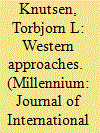

|
|
|
|
|
| Publication |
2014.
|
| Summary/Abstract |
The Eurocentric Conception of World Politics is a fabulous but depressing genealogy of the modern study of International Relations (IR). The book is impressively comprehensive in content, It is complex in design. It exposes the self-serving dogmatism which have always marked mainstream IR literature. While admiring the scholarly qualities of the book, this review wonders if its critical exposure is excessive? Is there any scholarly approach in IR which is not crippled by its comprehensive condemnation? Does this book, which is written in the European tradition of Critical Theory, ultimately become a victim of its own sweeping criticism of the Western canon?
|
|
|
|
|
|
|
|
|
|
|
|
|
|
|
|
|
|
|
|
|